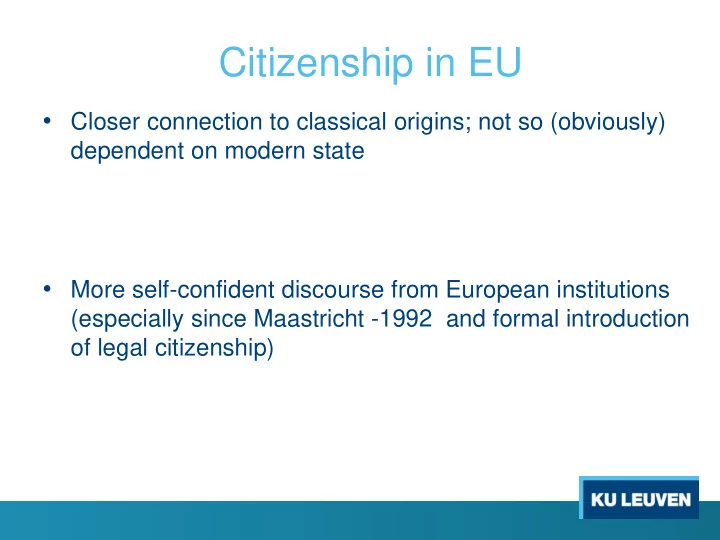

Citizenship in EU • Closer connection to classical origins; not so (obviously) dependent on modern state • More self-confident discourse from European institutions (especially since Maastricht -1992 and formal introduction of legal citizenship)
Core features of citizenship • (LEGAL) STATUS • (POLITICAL) AGENCY • (SOCIAL) IDENTITY • ONE SINGLE INTEGRATED TITLE OF CITIZEN
QUALITIES OF CITIZENSHIP • Particular polity • Integrated title (see previous slide) • Special association • Exclusive or predominant link
Why exclusive or predominant link? • Special allegiance Where conflict or divergence of perspectives between polities, we align ourselves with one polity rather than another, • Superordinate or organising public identity Citizenship is a kind of compass - an orienteering equipment for our public selves
Challenge of EU Citizenship • Compulsory duality/plurality How does this square with? • Double singularity (i.e. singularity or integrity of citizenship title AND singularity of citizen’s relationship with a particular polity
EU Citizenship Options • Consolidation and spread of liberal national citizenship • Supranational citizenship supplants and succeeds national citizenship • European citizenship as a composite category All three options unduly reductive, so fourth option • Citizenship PLUS denizenship (as a supplementary public identity facilitated by EU citizenship)
Consolidating National Citizenship • Guards against external aggression, exclusionary culture, and discrimination against internal minorities • Spreads to Southern, Central and Eastern Europe in waves of Enlargement BUT • Disregards supranational identity as a self-standing value • Tends to ignore ‘third country’ nationals from outside the EU’s ‘big tent’
Supranational citizenship supplanting and succeeding national citizenship • Takes postnational public identity seriously • Consistent with neo-functionalist and other ‘scalar’ explanations of the development of politics and law BUT • Tends to overstate the supranational level and ‘crowd out’ the national level • In any case, not borne out by empirical developments
Composite (national and EU) Citizenship • Takes both levels seriously • Suggests a natural ‘jurisdictional’ split in terms of dominant interests in play (European or national) BUT • Which interests predominate begs the question of our readiness to put things in common • That depends upon our affinities, which may vary
Enter the Denizen • Conceptually distinct from citizenship • Habitual residence • Affects an increasing number of European dwellers, both EU citizens as ‘second country nationals’ and non-EU citizen ‘third country nationals’ • Doubly denationalized - rights acquired through domicile, and connection to a locality rather than a state
Value added of denizenship • (Legal) Status not restricted to citizens • (Political) Agency as a member and participant in local community • (Social) Identity in common with others in locality • Many (but not only) EU citizens, in addition to their citizenship, are also denizens or have also been denizens • Can be an identity of choice • Provides a kind of secondary solidarity (confident residence, local connection, sense of this as an increasingly typical European form of life)
Limitations of denizenship • Some denizens are citizens denied or much delayed • May invite new exclusionary categorization ( Compared to refugees and ‘Illegals’) • Today, both supranational citizenship and denizenship seems to be under pressure simultaneously
Recommend
More recommend